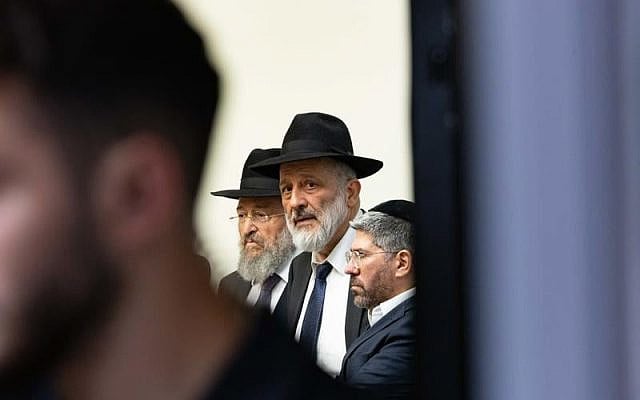The dangerous theology behind Israel’s coalition partners

“The October 7 massacre saved the Jewish people,” declared Shas leader Rabbi Aryeh Deri in a recent interview, igniting widespread outrage. But to anyone familiar with Haredi (ultra-Orthodox) discourse, Deri’s words were no surprise. They reflect a deeply rooted theology, rarely exposed to the broader Israeli public, that views national tragedy as divine intervention. This worldview demands close attention, not just for what it says about Haredi society, but for what it means for the future of Israeli democracy.
At the core of this belief system is the conviction that Hamas acted as an agent of God. While Haredi politicians avoid saying this explicitly, it is a common theme in Haredi media and internal discourse. Public-facing messaging focuses on “open miracles” and emphasizes that all events, good or bad, occur solely by divine will.
Take, for example, Bnei Brak, the ‘City of Torah.’ In previous conflicts, rabbis, including Rabbi Chaim Kanievsky, promised that missiles would never strike the city. Yet in the current war, not only was Bnei Brak hit, but a Haredi school was destroyed, leading to strained efforts by rabbinic figures to reconcile past reassurances with present reality.
A recently published book recalls a similar incident from the 1991 Gulf War, when a missile landed on the Ramat Gan-Bnei Brak border. The Haredi public rejoiced that it fell just outside Bnei Brak, but Rabbi Elazar Shach dismissed the rejoicing as foolishness and asked why most missiles were falling on Friday nights, concluding that it was divine punishment for how the community was observing Shabbat.
This theological outlook is anchored in a Talmudic principle (Hullin 7b): “A person only injures his finger if it is decreed from above.” According to this view, all suffering, however extreme, is intentional.
"Leading"? Pathetic rabbis applied this belief immediately after the Simchat Torah
massacre, insisting that every drop of blood spilled was foreseen and
intended by God. This is not a fringe belief, it is the mainstream view
of both Ashkenazi and Sephardi Haredi leadership, repeated regularly
since October 7.
This is how they explain the Holocaust. It’s how they explained COVID-19. It’s how they understand every tragedy in Jewish history. According to Haredi media, such events are either meant to prompt repentance or serve some hidden spiritual benefit. Maimonides is frequently cited to support this view: in his ‘Laws of Fasts’, he warns that if people fail to recognize suffering as divine punishment, God will respond with greater severity.(Yet, in his Moreh Nevuchim, he disavows any way of knowing god or his intentions)PM
Shortly after the October 7 massacre, Rabbi Dov Lando, one of the rabbinic leaders of the Lithuanian (non-Hasidic) yeshiva world, called it a divine punishment intended to awaken the people to repent. He applied the same logic to the Holocaust: “The Holocaust was divine judgment. God brought the Holocaust.” Similarly, Rabbi Avraham Salim, a member of the Shas Council of Torah Sages, said that “the Holocaust also started this way. The terrorists were just messengers of the Almighty… Just like with Covid, although it was a global pandemic, it was also meant specifically for the Jewish People.”
A recent editorial in Yated Ne’eman, the daily newspaper of the Degel HaTorah faction, took this even further. It argued that God occasionally performs “open miracles” for Israel’s enemies to help them strike Jews. According to the editorial, the failure of the IDF and intelligence agencies wasn’t a failure at all; it was divine blinding, so as not to interfere with God’s plan.
While there is broad agreement in these circles that the massacre was orchestrated by God, there is debate over its purpose. Rabbi Deri believes it prevented a greater tragedy. Others see it as heralding the coming of the Messiah: God, they claim, stirred “the Ishmaelites” to attack as a call for repentance and spiritual preparation. Still others see it purely as punishment: “If such a decree came upon us on the happiest day of the year,” wrote Rabbi Shlomo Machpud, “our sins must have caused it.” Elya Brudny from the Agudah " All tragedies are with God's will" PM
A fundamentally foreign worldview
A newer theological thread has also emerged, invoking Satan. A Shas-affiliated newspaper recently suggested the war is not truly between Israel and Hamas, or Israel and Iran, but a cosmic battle between God and the forces of evil. According to the editorial, this is “not a war of missiles and tanks, but of Talmud pages, Psalms, and good deeds.” Everything else, they claim, is just stagecraft in a divine drama.
This is the religious worldview guiding Deri and his Haredi partners in Israeli politics. He didn’t misspeak. He voiced a belief deeply rooted in the religious worldview of the Haredi world and its spiritual leadership.
But it is a worldview fundamentally foreign to most Israeli and Diaspora Jews, and it is vital that Israelis – and especially the heads of the non-Haredi political parties – understand what kind of ideological ‘package deal’ they’re accepting when they rely on Haredi and messianic factions to form governing coalitions.
Understanding the theology behind October 7 is important in its own right. But it’s also essential for grasping the broader challenge Israel faces. Far from being ‘natural partners’ for a governing coalition, the Haredi political parties are rooted in a radically different worldview.
For too long, political parties across the spectrum have played a cynical game, ignoring the long-term interests of the State and its citizens.
https://blogs.timesofisrael.com/the-dangerous-theology-behind-israels-coalition-partners/


